Tinnitus Treatment
What is tinnitus?
It’s a condition in which an individual hears sound (e.g. buzzing, ringing, whistling, clicking or pulsing sounds) in the absence of external sound. It’s a symptom, rather than a disease in itself.The loudness and pitch of this sound can vary across individuals. The sound may be constantly present or it might disappear and return.
If you have tinnitus that has persisted for over a week or you have tinnitus along with dizziness or hearing loss you should make an appointment to see your doctor.
For further information about the types of tinnitus and the impact they can have on you click here.
Can Tinnitus be treated?
Yes, the best treatment option will vary according to whether there’s an identifiable cause and if so also according to the nature of that cause. That’s why it’s important to see an audiologist or doctor if you’re concerned.
How will the best treatment option be selected for me?
Your doctor or audiologist will take a comprehensive case history by asking you questions about your symptoms and your medical history. An otoscope will be used (an instrument used to look inside the ear) to visualise the ear canal and the eardrum. In some circumstances medical imaging of your internal ear and the structures surrounding your ear is necessary.

An audiologist will refer you to a doctor if they believe a medical examination is required and a doctor will refer you to an audiologist to have your hearing tested since tinnitus is frequently accompanied by hearing loss.
The hearing assessment will generally include audiometry and may also include other forms of hearing tests. To complete an audiometry test your audiologist will give you a set of headphones and play sounds of varying pitches and loudness levels. You will be required to respond when you hear a sound by pressing a button or raising your hand.
How is tinnitus treated?
If an underlying cause is identified then treating the cause should reduce or eliminate the sounds in your ears. The main treatments used when an identifiable cause is found include taking medications or adjusting your current medications, using hearing aids, removing ear wax/foreign bodies and reducing exposure to loud noise.
The table below includes the major causes of tinnitus and their appropriate treatment options.
| Cause | Treatment |
|---|---|
| Excessive noise exposure on one occasion or cumulative noise exposure | -Minimise further damage to the hearing system by reducing noise exposure or wearing protective devices, like ear plugs -Hearing aids may help to reduce or eliminate the sounds in your ears |
| Head and neck injuries | -Surgery to repair the damage -Hearing aids |
| Ear infections | -Insertion of a grommet to drain fluid from the middle ear -Antibiotics |
| Meniere’s Syndrome | -A combination of medication and lifestyle changes |
| Normal aging process | -hearing aids |
| Ototoxic drugs (drugs that damage the cochlear) | -Ceasing the intake of these drugs and adjusting medications |
| Foreign object or earwax touching the eardrum | -To remove earwax ear drops or ear irrigation may be used -Ear irrigation involves using water to remove ear wax |
| Eustachian tube problems (a tube that connects the middle ear to the nasal cavity and controls the air pressure within the middle ear) | -Insertion of grommets into the eardrum to prevent excessive air pressure build up in the middle ear -Treating the cold that may be blocking the eustachian tube |
| Temporomandibular joint problems (the joint between the lower jaw and the temporal bone) | -Anti-inflammatory medications -Eating a soft food diet -Temporomandibular joint exercises can be prescribed |
| Cardiovascular diseases | -Medications -Lifestyle changes |
| Diabetes? | -Medications -Lifestyle changes |
| Tumour | -Surgery to remove the tumour -Chemotherapy or radiotherapy -A benign tumour may not be appropriate to treat |
| Any form of hearing loss should be treated as this can produce or exacerbate tinnitus | -Hearing aids -Cochlear implants -Bone conduction hearing aids -Surgery -Various other options depending on the type of hearing loss |
How is Tinnitus Managed?
When no identifiable cause can be found a range of management options can be selected.These are listed below.How can my tinnitus be managed when an underlying cause cannot be determined?
- Sound therapy
- Relaxation therapy
- Cognitive behavioural therapy (CBT)
- Counselling
- Mindfulness meditation
- Tinnitus retraining therapy (TRT)

Overtime many individuals find that they habituate to tinnitus, i.e. they become used to the sounds and are no longer aware of them or the sounds don’t bother them any more. But, it is still necessary to seek professional help if you’ve had buzzing, ringing, whistling, clicking or pulsing sounds in your ears for longer than a week because it may be a sign of an underlying condition.
| Cause | Treatment |
|---|---|
| Excessive noise exposure on one occasion or cumulative noise exposure | -Minimise further damage to the hearing system by reducing noise exposure or wearing protective devices, like ear plugs -Hearing aids may help to reduce or eliminate the sounds in your ears |
| Head and neck injuries | -Surgery to repair the damage -Hearing aids |
| Ear infections | -Insertion of a grommet to drain fluid from the middle ear -Antibiotics |
| Meniere’s Syndrome | -A combination of medication and lifestyle changes |
| Normal aging process | -hearing aids |
| Ototoxic drugs (drugs that damage the cochlear) | -Ceasing the intake of these drugs and adjusting medications |
| Foreign object or earwax touching the eardrum | -To remove earwax ear drops or ear irrigation may be used -Ear irrigation involves using water to remove ear wax |
| Eustachian tube problems (a tube that connects the middle ear to the nasal cavity and controls the air pressure within the middle ear) | -Insertion of grommets into the eardrum to prevent excessive air pressure build up in the middle ear -Treating the cold that may be blocking the eustachian tube |
| Temporomandibular joint problems (the joint between the lower jaw and the temporal bone) | -Anti-inflammatory medications -Eating a soft food diet -Temporomandibular joint exercises can be prescribed |
| Cardiovascular diseases | -Medications -Lifestyle changes |
| Diabetes? | -Medications -Lifestyle changes |
| Tumour | -Surgery to remove the tumour -Chemotherapy or radiotherapy -A benign tumour may not be appropriate to treat |
| Any form of hearing loss should be treated as this can produce or exacerbate tinnitus | -Hearing aids -Cochlear implants -Bone conduction hearing aids -Surgery -Various other options depending on the type of hearing loss |
- Behind the ear sound generators
- In the ear sound generators
- Sound pillows
- Desktop and bedside sound generators
